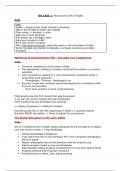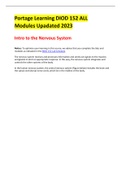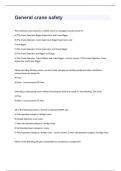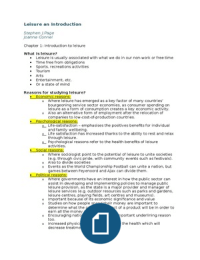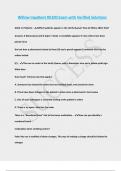COMPULSORY ASSIGNMENT FOR SEMESTER 1: ASSIGNMENT 01
Total: 50
Study material: Lessons 1 to 2
Weight: 20%
Due Date: 10 March 2023
Unique number: 793467
Note: This is a written assignment that must be submitted on myUnisa, in PDF only.
Question 1
1.1 Identify and then, in your own words, discuss the characteristics of the perspective of a
competent human being presented in the excerpt. (16)
The interdependent orientation provides a model, which, while not swallowing you against your will,
gives you the personal, visceral sense that you are part of a greater whole. The characteristics of the
perspective of a competent human being articulated in the scenario explains the principle-centred
people by Stephen Covey. According to Harry (2017:19), Stephen Covey suggests that people can
, only experience true success and enduring happiness if they learn and integrate the principles of
character ethic, traits such as sincerity, honesty, humility, courage and integrity. The characteristics
are as follows.
- They’re more flexible and spontaneous than others. They are not chained to plans and
schedules, although they regard them as important. They are courageous explorers going on an
expedition into uncharted territories; they are not really sure what is going to happen, but they
are confident it will be exciting and growth-producing and that they will discover new territory
and make new contributions. Their security lies in their initiative, resourcefulness, creativity,
willpower, courage, stamina and native intelligence rather than in the safety, protection and
abundance of their home camps and of their comfort zones.
- They are continually learning. Principle-centred people are continually educated by their
experiences. They read widely, they seek training, they listen to others and they feast on the
wisdom of the ages. They are curious, always asking questions. They continually expand their
competence, their ability to do things. They develop new skills, new interests. Most of this
learning and growth energy is self-initiated and feeds on itself.
- They enjoy life more than others. They don’t condemn themselves for every foolish mistake or
social blunder. They forgive themselves and others. They don’t brood about yesterday and
daydream about tomorrow. They live sensibly and joyfully in the present, carefully plan for the
future and flexibly adjust to changing circumstances.
- They radiate positive energy. The countenances of principle-centred people are cheerful,
pleasant and happy. Their attitude is optimistic, positive, and upbeat. Their spirit is enthusiastic,
hopeful, believing. This positive energy is like an energy field or an aura that surrounds them and
that similarly charges or changes weaker, negative energy fields around them. They also attract
and magnify smaller positive energy fields. When they come into contact with strong, negative
energy sources, they tend either to neutralise or to sidestep this negative energy.
- They have richer, more rewarding relationships than others. Principle-centred people don’t
overreact to negative behaviours, criticism or human weakness. They clarify expectations.
They’re quick to forgive and they don’t carry grudges. They’re genuinely happy for and help
facilitate the successes of others. They believe in the unseen potential of all people. They refuse
to label other people, to stereotype and to prejudge. Rather they see the oak tree in the acorn
and understand the process of helping the acorn become a great oak.
- They are synergistic. Synergy is the state in which the whole is more than the sum of the parts.
Principle-centred people are synergistic. They are change catalysts. In team endeavours, they
learn to build on their strengths and work to complement their weaknesses with the strengths of
others. When principle-centred people negotiate and communicate with others in seemingly
adversarial situations, they learn to separate the people from the problem.
- They become more confident and secure than others. They grow in their confidence that living
in harmony with others will bring quality of life, and they become more patient and peaceful in
the process. Their security does not come from work, associations, recognition, possessions,
status or any other extrinsic factor. It comes from within – from centring their lives on principles,
from living by their conscience.
- They lead balanced lives. They don’t become workaholics, political fanatics, crash dieters, food
bingers, pleasure addicts or fasting martyrs. They are active physically, socially, mentally and
spiritually. They participate in some kind of balanced, moderate, regular programme of
cardiovascular exercise – using the large leg muscles and working the heart and lungs. This
provides endurance – improving the capacity of the body and brain to use oxygen – along with
many other physical and mental benefits. They exercise their minds through reading, creative
Total: 50
Study material: Lessons 1 to 2
Weight: 20%
Due Date: 10 March 2023
Unique number: 793467
Note: This is a written assignment that must be submitted on myUnisa, in PDF only.
Question 1
1.1 Identify and then, in your own words, discuss the characteristics of the perspective of a
competent human being presented in the excerpt. (16)
The interdependent orientation provides a model, which, while not swallowing you against your will,
gives you the personal, visceral sense that you are part of a greater whole. The characteristics of the
perspective of a competent human being articulated in the scenario explains the principle-centred
people by Stephen Covey. According to Harry (2017:19), Stephen Covey suggests that people can
, only experience true success and enduring happiness if they learn and integrate the principles of
character ethic, traits such as sincerity, honesty, humility, courage and integrity. The characteristics
are as follows.
- They’re more flexible and spontaneous than others. They are not chained to plans and
schedules, although they regard them as important. They are courageous explorers going on an
expedition into uncharted territories; they are not really sure what is going to happen, but they
are confident it will be exciting and growth-producing and that they will discover new territory
and make new contributions. Their security lies in their initiative, resourcefulness, creativity,
willpower, courage, stamina and native intelligence rather than in the safety, protection and
abundance of their home camps and of their comfort zones.
- They are continually learning. Principle-centred people are continually educated by their
experiences. They read widely, they seek training, they listen to others and they feast on the
wisdom of the ages. They are curious, always asking questions. They continually expand their
competence, their ability to do things. They develop new skills, new interests. Most of this
learning and growth energy is self-initiated and feeds on itself.
- They enjoy life more than others. They don’t condemn themselves for every foolish mistake or
social blunder. They forgive themselves and others. They don’t brood about yesterday and
daydream about tomorrow. They live sensibly and joyfully in the present, carefully plan for the
future and flexibly adjust to changing circumstances.
- They radiate positive energy. The countenances of principle-centred people are cheerful,
pleasant and happy. Their attitude is optimistic, positive, and upbeat. Their spirit is enthusiastic,
hopeful, believing. This positive energy is like an energy field or an aura that surrounds them and
that similarly charges or changes weaker, negative energy fields around them. They also attract
and magnify smaller positive energy fields. When they come into contact with strong, negative
energy sources, they tend either to neutralise or to sidestep this negative energy.
- They have richer, more rewarding relationships than others. Principle-centred people don’t
overreact to negative behaviours, criticism or human weakness. They clarify expectations.
They’re quick to forgive and they don’t carry grudges. They’re genuinely happy for and help
facilitate the successes of others. They believe in the unseen potential of all people. They refuse
to label other people, to stereotype and to prejudge. Rather they see the oak tree in the acorn
and understand the process of helping the acorn become a great oak.
- They are synergistic. Synergy is the state in which the whole is more than the sum of the parts.
Principle-centred people are synergistic. They are change catalysts. In team endeavours, they
learn to build on their strengths and work to complement their weaknesses with the strengths of
others. When principle-centred people negotiate and communicate with others in seemingly
adversarial situations, they learn to separate the people from the problem.
- They become more confident and secure than others. They grow in their confidence that living
in harmony with others will bring quality of life, and they become more patient and peaceful in
the process. Their security does not come from work, associations, recognition, possessions,
status or any other extrinsic factor. It comes from within – from centring their lives on principles,
from living by their conscience.
- They lead balanced lives. They don’t become workaholics, political fanatics, crash dieters, food
bingers, pleasure addicts or fasting martyrs. They are active physically, socially, mentally and
spiritually. They participate in some kind of balanced, moderate, regular programme of
cardiovascular exercise – using the large leg muscles and working the heart and lungs. This
provides endurance – improving the capacity of the body and brain to use oxygen – along with
many other physical and mental benefits. They exercise their minds through reading, creative

